Description
WHO FACES WRITER’S BLOCK?
At some time or other, every writer faces the dreaded “writer’s block.” For some, a block will doom them to a tedious halt. It may even bring a deadly blow to the manuscript. For others, however, writer’s block is a temporary inconvenience and they push through, producing a manuscript that is possibly better than the one they had originally conceived.
In Don’t Let Writer’s Block Stop You, you will understand the difference between the two sorts of writers and you will learn to be the sort of writer that springs back.—applying best practices that every writer can learn to use.
WHAT YOU’LL LEARN IN THIS BOOK
In Don’t Let Writer’s Block Stop You/How to Push Beyond Stuck, you’ll learn how to apply a number of techniques and practices to get you going again—your writing will not only survive but it will thrive.
You will learn:
-
- why it is dangerous to talk about your writing while it is in progress
-
- how you can counter some deadly mental traps
-
- when to make use of “tricks of the trade” to work through blocks more easily
-
- what tasks to turn to when writing seems impossible
-
- how to make a writing block work for you—really!
These and more best writing practices will get you going again. The part you will probably enjoy the most? You will learn practices that will help you to love to write more than ever.
Whether you are writing a memoir, creative non-fiction, or fiction, the suggestions in this book—as those in the other books of the Memoir Network—are solid. With its guidance, you need never again dread “writer’s block.” You will now know what a block means in your writing life and how to respond in a way that is supportive of your writing.
Don’t Let Writer’s Block Stop You/How to Push Beyond Stuck doesn’t contain fluff. Each suggested step of the unblocking process is clearly described. You will learn why each remedy is important in itself and how to implement it. You will also come to see how applying several of them at the same time can energize you.
This book, as all Memoir Network books, helps you to “write from the inside out” so that you might learn how to trust yourself in this process of becoming a writer. It is part of a series of Memoir Network Writing books and the first to be published. More are on the way. Please check back for additional titles.
With this guide, you’ll find that you Don’t Let Writer’s Block Stop You.Instead you can let writer’s block teach you How to Push Beyond Stuck
Would You Like To Know More?
Download Don’t Let Writer’s Block Stop You, now and start writing again today!
THE MEMOIR NETWORK WRITING SERIES
Whether you are writing a memoir, creative non-fiction, or fiction, the suggestions in this book—as those in the other books in the Memoir Network Writing Series—are applicable.
For a full listing of all the books in the Memoir Writing Series, click here.

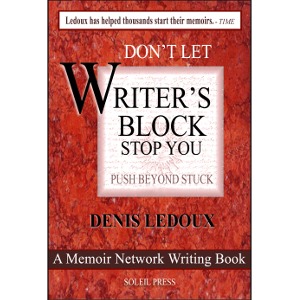

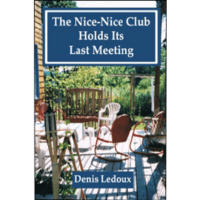
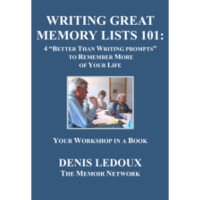
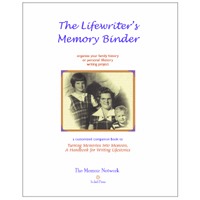
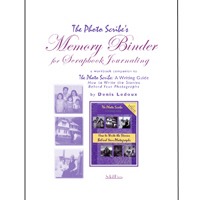
Nell Whiting –
Wanting to write but feeling you have nothing to say, or being stymied by thinking you can’t, is one of the world’s worst sensations. It cripples the creative urge and causes countless valuable tales to languish untold. Ledoux’s manual is a sound, practical approach to moving past the paralysis. He dispassionately discusses the truth about the creative process and provides insights into the reasons why we end up blocking ourselves. Best of all, the Action Steps at the end of the chapters offer concrete ways to muscle through the dry spells.
Gil Michelini –
In this book, Ledoux shares his experience teaching workshops on writing memoirs. If this book represents what Ledoux is like in the workshops, they must good because at the end of the first paragraph, he simply says the cause of writer’s block: “What seems like writer’s block is really poor writing discipline!” I like that tell-it-like-it-is attitude. Some of his other to-the-point quotes include: “Lack of discipline is an enemy of writing lying in wait for you.” and “Writers write because writing is what they have to do to get their work done.”
Ledoux ends each chapter with at least three action steps to help the reader focus on getting their story written. I presume these have been tested by his students in his many workshops.
He acknowledges that writing is more than putting your nose to the grindstone each day. By first identifying possible causes for not being able to get words on paper including writing for the wrong reason or trying to write material the writer does not have the ability or the desire to write, he then gives many excellent tricks of the trade to make writing easier. The last section of the book is filled with resources Ledoux has developed to help get a memoir written.
Robin Leigh Morgan –
I found the book to be quite informative, especially to aspiring authors who’ve been frustrated in writing their current endeavors. The exercises it contains are helpful in stimulating the creative juices we have inside those little grey cells of our minds.
Angela C –
Full of wisdom and pithy quotes to help you on your way, this blissfully short yet deeply significant book addresses the dreaded spectre of the writing freeze in such kindly, helpful tones that one is seduced, as by an adoring lover, to return and set to at once. Denis Ledoux is undoubtedly a wise soul who has given freely of his wisdom with wit, love and inspiration. READ and you cannot help but WRITE! As a writer also writing a book about writing, I really envied his friendly style as he gentles the reader back to their work. A real gem in the canon of ‘How to Write’ books.
DM Verbov –
In this little gem of a book, Denis Ledoux has once again established his supreme authority in the field of memoir writing. And indeed any writer facing the usual ‘writer’s block’ obstacles – which Ledoux frankly dismisses as a lack of discipline (which we all know to be true) – will find this book very useful. Ledoux describes it as it is and succinctly defines the common problems, feelings and blocks, offering dozens of practical and oft effortless exercises and prompts to snap out of them and just get down to work. With the voice of experience and a simple understanding of human nature and the writer’s soul, the author has created a handbook you can return to again and again – whether you yourself are stuck, whether you’re leading a writing workshop or whether other budding writers are asking you for advice. I for one will certainly be using many of the tips in here. Thank you Denis!
Edwina Carr-Jangarathis –
Denis explores the many aspects of writing which are more than just pen to paper and gives consideration to things that while part of writing do not seem the taxing chore one may convince themselves is keeping the writer from writing. The book reinforces the need to write for oneself putting aside judgments so easily imagined and used to stop one from moving forward. Uncomfortable often too emotional thoughts that develop when attempting to capture a long ago memory are addressed and examined. Suggesting the use of memory lists as well as other exercises gradually brings back the need to stop telling oneself excuses used for not writing and allows one to be less than perfect. It helps to begin to look at the many ways to create what we dream of placing on paper. Denis LeDoux a leader in memoir writing has captured the essence of his workshops and placed them on the page to once more encourage the memorialist to move forward and begin to make writing the joy it can be. A copy of Don’t Let Writer’s Block Stop You should be kept at hand whenever and wherever one writes.
Mary Anne Benedetto –
In my opinion, Denis Ledoux is the King of Memoir Writing. His Don’t Let Writer’s Block Stop You: How to Push Beyond Stuck gives us several beneficial tips and hints, along with action steps to take in order to make steady progress in our writing projects. Although some chapters relate specifically to memoir writing, several action steps are valuable and transferable for writing in any genre.
I especially liked Ledoux’s suggestion of lingering over your stories. People often seem to race through a writing project as though it was a repulsive chore–like preparing our taxes. Particularly in memoir writing, the benefit of lingering and taking your time is that one memory definitely leads to another. Consider it an adventure, and see where it leads you.
Stuffed full of great ideas, this compact book may just be the perfect medicine for your case of writer’s block!
Art Bliese –
I found the book very helpful especially for those who are “stuck” in writing and needing encouragement to do it. As a pastor, I wrote (now retired) a sermon a week and found by experience what Denis says in this book regarding inspiration (waiting for some special thought before starting). Once a person starts to write, the message you have starts to flow. It is like a ball-point pen, the ink doesn’t flow until it hits the paper. Inspiration comes when the writing is in the process of being done. The practical suggestions are helpful to get the writer do what is helpful to others as well as to himself — and that is to write one’s story down on paper. Well worth the money. Thanks, Denis.
Art Bliese, pastor and memoir writer
Denis Ledoux –
Thanks for your note. I much appreciate it. This book is one that contains a message that all “blocked” writers should pay attention to.
Viga Boland, author No Tears for my Father –
This is a quick, easy read but it’s full of useful advice on how to free yourself and start writing again. I got ideas from this book that I can’t wait to share with members of my workshop. As I read about “task-oriented writers” I recognized members in my workshop who are, as Denis describes, so “rational, logical writers who are pursuing their need to be orderly and sequential” that their writing lacks spontaneity. Such writing so often fails to do what Denis says here, i.e. “… writing should sound as if it had spilled out on the page rather than was painfully labored over for a long time.” I find this is especially true when writing memoir. Denis points out that we shouldn’t rush the writing; instead we should linger with our stories so we can feel our way through the writing, just as we would linger on and gaze at a beautiful sunset.
T. MATSUBAYASHI –
This book is very very good. I wish I had read it when I was writing my PhD thesis! The book is full of wonderful suggestions and exercises that can be useful for any types of writers.
Kynthia Rose –
This book helped me push forth my writing. I would recommend to anyone who feels they get stuck in the process.